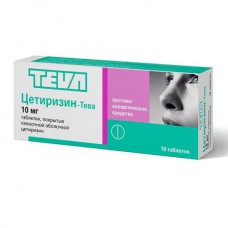Expiration date: 12/2026
Trade name: Cetirizine-Teva
Pharmacological action: Antihistamine, antiallergic.
Indications: Seasonal and perennial allergic rhinitis, pollinosis, allergic conjunctivitis, chronic idiopathic urticaria, pruritus, angioedema, complex therapy of atopic dermatitis, chronic eczema, bronchial asthma.
Contraindications: the Hypersensitivity, including to gidroxizin, pregnancy, breast-feeding, child up to 2 years (6 years with impaired renal function or liver). Restrictions apply: impaired renal function and liver, old age.
Application of pregnancy and breast-feeding: no Data available.
Side effects: From the nervous system and sensory organs: drowsiness, fatigue, agitation, headache, dizziness, anxiety, nervousness, emotional lability, impaired concentration and thinking, insomnia, depression, euphoria, confusion, amnesia, depersonalization, ataxia, coordination of movements, tremor, giperkinez, cramps of calf muscles, paresthesia, dysphonia, myelitis, paralysis, ptosis, violation of accommodation and vision, eye pain, glaucoma, xerophthalmia, conjunctivitis, hemorrhage in the eye, ototoxicity, tinnitus, deafness, violation of the sense of smell. On the part of the digestive tract: dry mouth, change or lack of taste perception, increased appetite, anorexia, stomatitis (including ulcerative), color change and swelling of the tongue, increased salivation, increased korisnost, thirst, vomiting, dyspepsia, gastritis, abdominal pain, flatulence, diarrhea, constipation, hemorrhoids, melena, rectal bleeding, liver dysfunction. From the cardiovascular system: headache, rarely - palpitations, hypertension, heart failure. From the respiratory system: rhinitis, epistaxis, nasal polyp, pharyngitis, cough, sinusitis, bronchitis, increased bronchial secretions,bronchospasm, dyspnea, upper respiratory infection, pneumonia, hyperventilation. From the urogenital system: delay urination, swelling, polyuria, dysuria, hematuria, urinary tract infection, cystitis, reduced libido, dysmenorrhea, intermenstrual bleeding, menorrhagia, vaginitis. On the part of locomotor apparatus: arthralgia, arthritis, arthrosis, myalgia, back pain, muscle weakness. With the skin: dry skin, rash, blisters, itching, acne, furunculosis, dermatitis, eczema, hyperkeratosis, erythema, increased sweating, alopecia, angioedema, hypertrichosis, photosensitivity, seborrhea. Other: malaise, fever, chills, hot flashes, dehydration, diabetes mellitus, lymphadenopathy, breast pain, weight gain, allergic skin reactions, including hives.
Interactions: Theophylline significantly reduces ground clearance. Compatible with azithromycin, pseudoephedrine, ketoconazole, erythromycin, diazepam and cimetidine.
Dosing and administration: Inside, regardless of meals, not chewing and drinking plenty of fluids, preferably in the evening. Adults and children over the age of 6 years (weighing more than 30 kg) — 1 tablet once a day.
Overdose: Symptoms: drowsiness, possible - anxiety, urinary retention, tremor, tachycardia, itching, rash. Treatment: gastric lavage, the appointment activated charcoal, supportive and symptomatic therapy. Hemodialysis is ineffective.
Special instructions: avoid concomitant use of oppressive Central nervous system, and alcohol consumption. Be wary of during the drivers of vehicles and people skills relate to the high concentration of attention.
Storage: store In dry, dark place at a temperature of 15-25 C.



